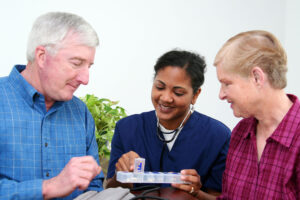Tips for Seniors to Avoid Medication-Related Problems

Senior home care can help aging seniors with medication management.
For many seniors, medication management is an important aspect of their health and wellness. What they might not know, however, is that as the body ages, it processes medications differently. This makes it more important than ever to handle medications with care. The truth is that errors or mismanagement can result in hazardous drug reactions, overdoses, or diminished medication efficacy.
The good news is that with the help of senior home care services and the following suggestions, seniors can avoid the risk of medication-related issues.
Create and Maintain a Medication List
Senior home care providers can help seniors create a medication list and keep it up to date. This list should include the following:
- All prescribed medications
- Over-the-counter medications
- Supplements and vitamins
- Dosage information for each
Seniors should be encouraged to bring this list to their medical appointments and ask any questions they may have to uncover potential interaction risks or redundant medications. This is especially important for seniors who would work with more than one doctor.
Use One Pharmacy
While seniors may need to see more than one doctor, they should be able to use the same pharmacy for all their medication needs. This allows the pharmacist to monitor medications and identify any interactions. It also gives seniors another consistent support system when they have questions or concerns.
Schedule Regular Medication Reviews
Regular checkups with a healthcare provider are essential. During these check-ins, seniors can discuss whether each medication is still needed, if the dosage is suitable, and if there are any alternative treatments.
Understanding Medications
Senior home care providers can work with seniors to help them understand why they take each prescription and how it works. If they are confused about certain aspects or simply want more information, they should also be encouraged to write those things down and talk with their medical team about them.
Some of the questions seniors might want to ask include the following:
- What is the medication intended to do?
- What are the possible side effects?
- Should it be taken with a meal or on an empty stomach?
- What time of day works best for this medication?
Storage of Medications
Unless otherwise noted, medications should be kept cool and dry. Improper storage, such as leaving them in a humid bathroom, can weaken their effect. Additionally, medications should always be kept out of the reach of minors or anyone who could abuse them.
Seniors might also need assistance with organization, such as using pill containers if they take more than one or two medications.
Safe Disposal
Keeping outdated or unneeded medications around raises the possibility of accidental intake or misuse. Many pharmacies provide safe disposal services, and seniors can also engage in community medication take-back initiatives.
Recognizing Side Effects
Dizziness, confusion, rashes, and mood swings are all common symptoms of a bad medication reaction. If seniors experience strange symptoms, they should be encouraged to call their doctor immediately. Senior home care providers and loved ones can also watch out for side effects, ensuring seniors remain safe.
Adopting these strategies allows seniors to significantly reduce the dangers connected with medications while maintaining a higher quality of life. Collaboration with healthcare practitioners, the use of organizational tools, and proactive monitoring thanks to senior home care are all essential components of establishing a safe and effective medication routine.
If you or an aging loved one is considering Senior Home Care in Centerville, VA, please contact the caring staff at Thrive Health Care Services today. (703) 992-0484
Sources:
